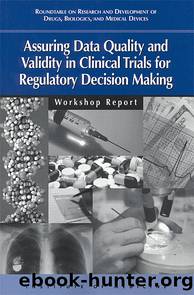Assuring Data Quality and Validity in Clinical Trials for Regulatory Decision Making: Workshop Report by Institute of Medicine

Author:Institute of Medicine
Language: eng
Format: epub
Tags: Health and Medicine
Publisher: NATIONAL ACADEMY PRESS
Published: 1999-07-27T00:00:00+00:00
Sanctions
Presented by Stan W. Woollen
Deputy Director, Division of Scientific Investigations
Center for Drug Evaluation and Research, Food and Drug Administration
A major goal of Food and Drug Administration (FDA) sanctions is not to punish wrongdoers but, rather, to protect the integrity of the approval process and the rights and welfare of human subjects. Sanctions accomplish this by notifying affected parties that corrective action is required and excluding the data or the parties that have corrupted the process. Sanctions can be imposed against (1) clinical investigators, (2) sponsors, and (3) Institutional Review Boards. However, sanctions are rarely imposed because few people or organizations deliberately fail to comply with FDA requirements.
Sanctions available for use against clinical investigators include, in order of increasing severity, warning letters, consent agreements, formal disqualification, debarment, and prosecution under criminal statutes. Warning letters communicate the need for corrective action, and FDA follows up to see that corrective actions are taken. Warning letters are not sent to foreign investigators unless they are working under an Investigational New Drug application. Repeated or deliberate noncompliance or submission of false information leads to formal disqualification, barring the investigator from receiving investigational products. A formal disqualification requires a regulatory hearing and can be a time-consuming process that takes 2 to 4 years, during which time the investigator may continue to conduct studies.
An alternative is a consent agreement, which results in voluntary disqualification or negotiated restrictions on the investigatorsâ activities, such as the number of studies an investigator may perform oversight by another investigator, or third-party verification of data. Consent agreements reduce legal and administrative costs and give FDA the ability to tailor the sanctions imposed.
Debarment under the Generic Drug Debarment Act effectively prevents an individual from working in the drug industry. FDA will not accept or review applications from individuals or companies who have been debarred. Furthermore, prosecution under criminal statutes, for example, for fraud against the government, will also result in debarment, but these most extreme sanctions are rare.
Sanctions may be imposed against sponsors (and against contract research organizations that assume the responsibility of a sponsor) for problems in their FDA submissions and for problems that arise at study sites. Problems with submissions to FDA, such as false statements of material fact or patterns of error that result in widespread problems with data integrity, may be handled under the application integrity policy. Under its application integrity policy, FDA will defer substantive scientific review until a validity assessment is completed and may refuse to approve or may withdraw approval of an application.
Regulations related to monitoring at the clinical site and dealing with non-compliant clinical investigators are vague, and the appropriate sanctions are not defined. Frequently, sponsors fail to report the problems or the corrective actions that have been taken. For example, none of the sponsors who used six egregiously noncompliant investigators reported the investigators to FDA. In these cases, sponsors excluded the data but did not terminate activities at the site and were not required by regulation to report the investigators. Issues concerning how FDA
Download
This site does not store any files on its server. We only index and link to content provided by other sites. Please contact the content providers to delete copyright contents if any and email us, we'll remove relevant links or contents immediately.
Human Diseases (MindTap Course List) (by Team-IRA) by Marianne Neighbors Ruth Tannehill-Jones(890)
Cancer Cell Culture by Unknown(450)
The Neglected Dimension of Global Security: A Framework to Counter Infectious Disease Crises by National Academy of Medicine Secretariat(441)
Imaging in Urology by Mitchell Tublin MD Joel B Nelson MD(426)
Statistical Methods in Health Disparity Research by J. Sunil Rao(426)
Health Behavior: Theory, Research, and Practice by Karen Glanz & Barbara K. Rimer & K. Viswanath(371)
Achieving Procreation : Childlessness and IVF in Turkey by Merve Demircioğlu Göknar(370)
Short Course in Medical Terminology by Nath Judi L.;(352)
Clinical Research in Occupational Therapy, Sixth Edition by Martin Rice;(321)
Wilkins' Clinical Practice of the Dental Hygienist by Boyd Linda D.;Mallonee Lisa F.; & Lisa F. Mallonee(318)
Murray's Basic Medical Microbiology E-Book by Murray Patrick R.;(302)
Anatomical Kinesiology by Gross Michael;(300)
Neuroscience Fundamentals for Rehabilitation by Lundy-Ekman Laurie(299)
Psychedelics As Psychiatric Medications by Nutt David;Castle David;(290)
The Human Central Nervous System by Unknown(283)
A Pocket Guide for Medical Students: From Enrollment to Job Interviews by Sarah Cuschieri(282)
Rang & Dale's Pharmacology 9th Edition plus Flashcards 2nd Edition by Unknown(274)
The Handbook of Medicinal Chemistry by Simon E Ward;Andrew Davis;(263)
Public Health and Society: Current Issues by Burke Lillian D.;Weill Barbara;(255)
